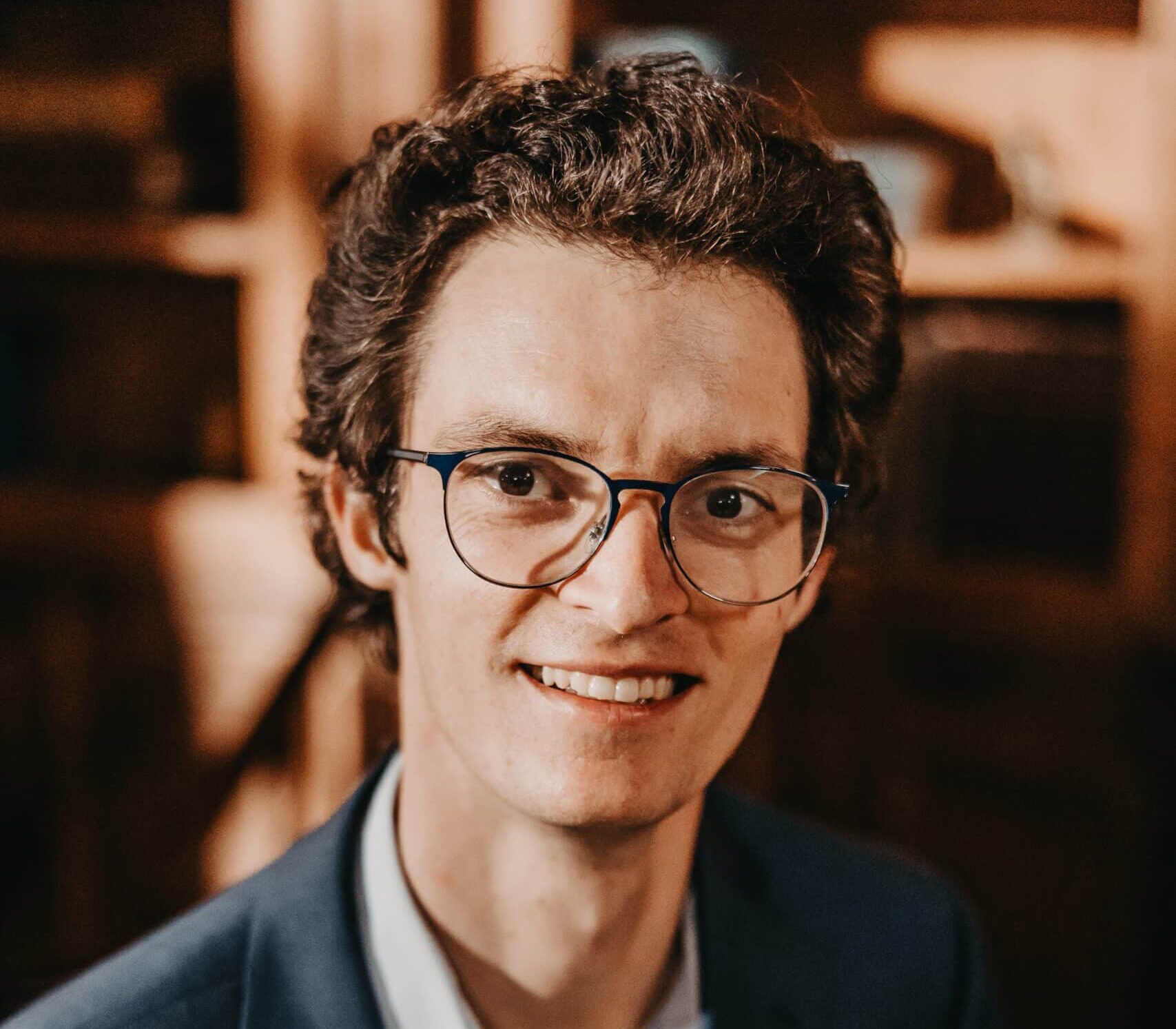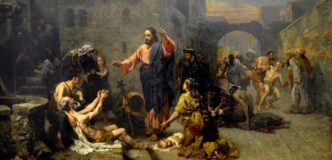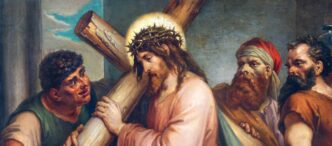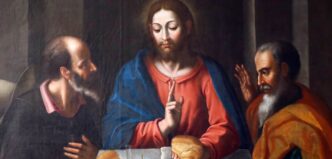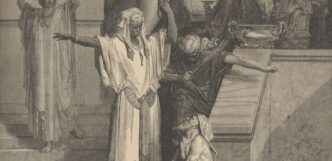In preparing to write this, I had planned for some time to connect the Scriptures with St. Augustine, whose feast we celebrate on his heavenly birthday, Aug. 28. This choice became more fitting after our new Holy Father emerged onto the central loggia of the Vatican Basilica this spring. An hour after white smoke rose, Pope Leo XIV declared himself before the Church and the world to be “a son of St. Augustine.” Just weeks before, I had published “Return to the Heart: The Biblical Spirituality of St. Augustine’s Confessions” (Emmaus Road Publishing). Leo, the first pope from the Augustinian Order, gave an immediate relevance to my scholarly labors on the person and message of St. Augustine.
In his “Confessions,” the first introspective autobiography, St. Augustine narrated his sinful departure from and graced return to God by comparing himself to the prodigal son in Jesus’ famous parable of Luke 15. Pope Leo reminded us, in one of his first general audiences, that a parable “throws before me a word that provokes me and prompts me to question myself.” By reading the story of the prodigal son alongside Augustine, we are given greater insight into the wisdom of Christ the teacher.
The parable begins with a father who had two sons. The younger son went to his father and asked for his share of the inheritance. In doing so he insinuated that he wanted his father dead, since this is the usual precondition for an inheritance. The insolent child then took his property and left for a distant country. His geographic departure was emblematic of his inner personal distance from his father. People did not know him, and he was without family or community. In the prodigal son’s dissolute living, he wasted the good gifts of his father. When we love something in place of God, we pour ourselves out, experiencing what Augustine described as disintegration. English idioms like “I am falling apart,” “feeling scattered” or “going to pieces” reflect this reality of the heart drained by its disordered loves. The young Augustine wasted his immense intellectual capacity seeking honors, influence and prestige.
An identity of sonship
After squandering his father’s money with loose living, a famine struck the land and the prodigal son “hired himself out to one of the citizens of that country.” The language of “hired himself out” is suggestive of more than applying for work. The word for “hired himself out,” more literally “joined,” is ekollethe, from the Greek verb kollao. The verb literally means to glue or adhere, like the medical uniting of a wound. It is the same verb that Jesus uses to describe a man clinging to his wife in the one-flesh union of marriage (Mt 19:5). The apostle Paul teaches that we are not to join ourselves to prostitutes; rather, we are to be joined to the Lord in one spirit (1 Cor 6:16-17). Collectively, these other scriptural uses of kollao demonstrate the familial, religious and moral resonances of the verb in the parable. The prodigal son was living, thinking, believing and worshiping like the citizens of the distant country. He abandoned the home of his father and in a time of desperation needed a place of refuge, a community of support. His surrogate “family,” however, was far from sufficient.
At the end of Book 2 of “Confessions,” St. Augustine identifies himself with the prodigal son: “I slid away from you and wandered away, my God; far from your steadfastness I strayed in adolescence, and I became to myself a land of famine.” In his sin, Augustine avoided the very thing which his soul craved. He did not desire the unperishable food of God, because his heart was arid and he did not recognize his hunger for God alone.
We next come to the hinge of the whole story: “He came to himself.” The Douay-Rheims translation renders it “returning to himself.” The prodigal son provides the pattern for the return to the heart. He experienced the disintegration caused by sin and recognized its effects in famine. In leaving his father, the prodigal son ceased to be himself, for sonship is the source of his identity. Jesus introduces the prodigal son simply as the younger son of a man (15:11-12); he has no name apart from that of “son.” The prodigal son’s conversion begins with reintegration (“when he came to himself”), repentance (“I have sinned against heaven and before you”), and an admission of dependence and need (“How many of my father’s hired hands have bread enough and to spare, but here I am dying of hunger!”).

The language of return here is reminiscent of phrases like “pull myself together” or “gather my thoughts.” It also is reflected in St. Augustine’s words (from which my book’s title was taken):
“He is most intimately present to the human heart, but the heart has strayed from him. Return to your heart, then, you wrongdoers, and hold fast to him who made you.”
The prodigal’s return to himself is not his own initiative. The memory of his father’s generosity, even to his servants, is what moves the prodigal to come to himself. Even in a far-off land, his father’s love calls to him. Our recognition of God’s good gifts and mercies draws us near to him. In Augustine’s lifetime, he fought against the “semi-Pelagian” heretics who incorrectly contended that the beginning of faith could be accomplished by the human will without grace. But even this first movement of returning to the self requires God’s grace. The God who made us is the God who calls us back to himself to be remade in his love.
Unearned love
Even in his desire to return to his father, the prodigal son had not accepted the reality of his sonship: “treat me like one of your hired hands.” Yet the prodigal son was still “far off, his father saw him and was filled with compassion; he ran and put his arms around him and kissed him.” The father ignored the prodigal son’s rehearsed speech and instead charged the servants with the preparation of a feast. The return to self and to God is also a return to communion with others.
The prodigal son was not an only child. We read above that his older brother was hard at work in the fields. The elder son’s industriousness can be interpreted as a positive characteristic. But it also put him at a distance from his father and signaled an incomplete grasp of his identity as a child. Curious about the music and dancing he heard, he questioned a servant instead of his father. The elder son, like the younger prodigal son, identified more as a servant than as a son. Angered by the servant’s explanation, he refused to go into the party. He found forgiveness more difficult than his father did. The father was again the initiator of reconciliation, entreating the elder son to join the celebration. God’s grace is always first.
The elder son refused his father’s invitation. “Listen! For all these years I have been working like a slave for you, and I have never disobeyed your command.” This is a narrow and shallow description of a parent-child relationship. If we make work and obedience the summit of being a son or daughter (in either human or spiritual relationships), we misconstrue what it means to be a child. Jesus again and again charged his disciples to receive a child in his name or to be like a child (Mk 9:36-37; 10:13-16). A child’s worth cannot come from his productivity or obedience, but from his very existence. Both brothers present two dead-end ways of seeking love and joy outside of God. The younger son sought pleasure outside of God. The elder son represents legalism or scrupulosity, challenges for those who strive for greater holiness. If I just pray enough, sacrifice enough, I will earn God’s love. The Spirit does not give anxiety or whatever else might paralyze us. The Spirit gives freedom. Until the younger son receives his childhood as a gift, he cannot live in the freedom of divine adoption (Gal 4-5). We cannot be left orphans, because our Father in heaven cannot die. We never have to leave the freedom and the peace that comes with being a child of God.
Luke 15’s triptych of lost-and-found parables (the sheep, the coin and the prodigal son) is introduced with the following verses: “Now the tax collectors and sinners were all drawing near to hear him. And the Pharisees and the scribes murmured, saying, ‘This man receives sinners and eats with them'” (Lk 15:1-2). The distance of the lost sheep, the coin and two sons from those to whom they belong stands out against the closeness of the sinners who draw near to Jesus. Notably, the sinners eat with Jesus. In the form of the parable, you can hear Jesus saying to his opponents who have distanced themselves, “Come to the party and stop moping outside.”

The healing response of the father is, “Son, you are always with me and all that is mine is yours.” The greatest gift the elder son has is that he never left the father’s house. When the younger son was in the distant country, or when the elder son was slaving away in the fields or pouting outside the party, the father was with them through love. We can never run away from God. “He is most intimately present to the human heart,” St. Augustine writes in “Confessions.” He is more interior to ourselves than we are. We can trip over him in our sins or return to him. What neither son understood is the relationship of gift: “All that is mine is yours.” At his last supper, Jesus echoes this understanding of sonship in a prayer to God the Father: “All mine are yours, and yours are mine” (Jn 17:10). An inheritance, understood financially, belongs either to the parent or the child. But the gifts of God can be possessed freely and indeed are magnified by being given away. Rest is found neither in the pleasures and honors of the world (symbolized by the younger son), nor in attempts to earn God’s love (the elder son). God’s love is not something to work for or look for. It is something we simply have as children. This unearned love is something to which we should hold fast.
Our return to God does not require physical travel. It only requires our heart, where God awaits, for it is there that heart speaks unto heart. The mystery we are to ourselves becomes a little clearer with the light of the Spirit who fathoms the human heart.
We can imagine a moment when the party ended and the younger son sat with his father (perhaps his mother too), surrounded by the flotsam of the feast, abiding with each other in silence. There was no need to explain, apologize or thank. The son and father simply rejoiced in the gift of being together — joined in a love that keeps no record of wrongs, that hopes all things, endures all things.
